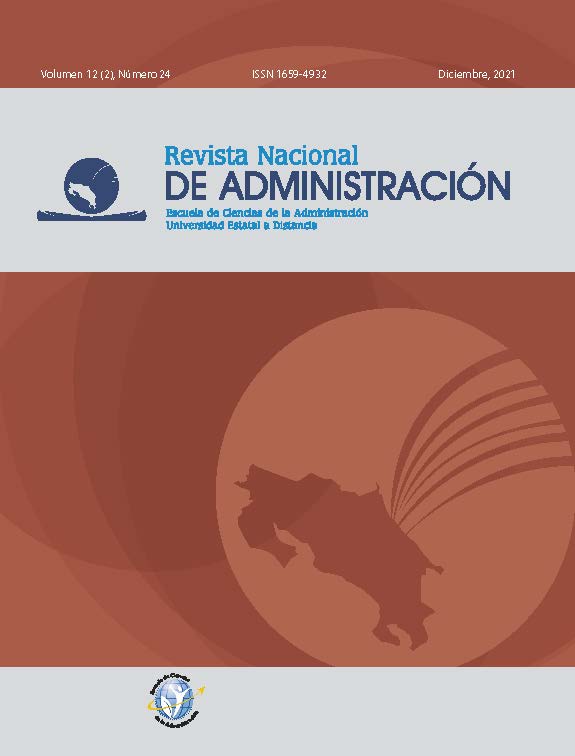Social vulnerability as the intersection of tangible and intangible variables: a proposal from an inductive approach
DOI:
https://doi.org/10.22458/rna.v12i2.3773Keywords:
Vulnerability, social disintegration, social economyAbstract
This paper aims to analyse social categories related to vulnerability through a qualitative approach. This reflection is based on sociology of poverty, and social vulnerability, with contributions from the theory of intersectionality and the concept of social disintegration. Through this approach, social vulnerability is a plural concept that results from the intersection of social positions, life experiences, and skills. The characteristics of social groups in situations of vulnerability will be examined through interviews with social workers in social economy organisations. The outcomes indicate that social vulnerability results from the intersection of socio-demographic and economic factors that weaken the educational and professional trajectory of people in situations of vulnerability, particularly about their social and emotional competencies. From this inductive approach, we propose an intersection of tangible and intangible variables to characterize the complex profile of people experiencing social vulnerability.
References
Bourdieu, P. (1989). O poder simbólico. Difel.
Capucha, L., Castro, J.L., Moreno, C., Marques, A.S. & Esperança, N. (1999). Grupos Desfavorecidos Face ao Emprego. Observatório do Emprego e Formação Profissional.
Carmo, R., Sebastião, J., Azevedo, J., da Cruz, S. & Firmino, A. (org.). (2018). Desigualdades Sociais. Portugal e Europa. Mundos Sociais.
Commission Regulation (EU). (2014). Regulations. Official Journal of the European Union, (651).
Costa, B. (1998). Exclusões Sociais. Cadernos Democráticos.
Costa, S., Santos, M. & Guerra, I. (coord.). (2018). Trânsito Condicionado. Barómetro do Observatório de luta contra a Pobreza na cidade de Lisboa Fase III. Cadernos EAPN, n.o 23.
David-Bellemare, E. & Williams, N. (n.d.). Pauvreté et précarité: une approche inspirée de l’intersctionnalité. Centre de Santé et de Services Sociaux, Université de Sherbrooke.
Diogo, F. (coord.). (2021). A pobreza em Portugal. Trajetos e Quotidianos. Fundação Francisco Manuel dos Santos. ISBN 978-989-9364-22-5.
Lima, L. & Trombet, C. (2017). Le travail de Conseiller en Insertion. ESF Éditeurs.
Marques, A. P. (2000). Repensar o mercado de trabalho: emprego Vs desemprego. Sociologia e Cultura 1. Cadernos do Noreste, Série Sociologia, 13(1), 133-155.
Marques, T., Matos, F., Maia, C. & Ribeiro, D. (2016). Metrópoles em crise [atas]. XV Coloquio Ibérico de Geografía: Retos y tendencias de la Geografía Ibérica, Múrcia.
Nogueira, C. (2017). Interseccionalidade e psicologia feminista. Editora Devires.
Organization for Economic Co-operation and Development [OECD]. (2018). Indicators of Immigrant Integration. OECDiLibrary. https://doi.org/10.1787/9789264307216-en
OECD. (2021). Gender Wage Gap (indicator). OECDiLibrary. https://www.oecd-ilibrary.org/employment/gender-wage-gap/indicator/english_7cee77aa-en
Paugam, S. (2006). A desqualificação social. Ensaio sobre a nova pobreza. Porto Editora. ISBN 978-972-0-34856-2.
Perista, P. & Batista, I. (2010). A Estruturalidade da pobreza e da exclusão social na sociedade Portuguesa-conceitos, dinâmicas e desafios para a ação. Revista Fórum Sociológico, (20), 39-46. http://sociologico.revues.org/165
United Nations Childrens Fund [UNICEF]. (2017). Narrowing the Gaps: The Power of Investing in the Poorest Children. UNICEF.
Zimmermann, A. (2017). Social Vulnerability as an Analytical Perspective. Discussion Paper N.o 4: Social Vulnerability as an Analytical Perspective.
Published
How to Cite
Issue
Section
Categories
License
Copyright (c) 2022 The National Administration Review

This work is licensed under a Creative Commons Attribution-NonCommercial-ShareAlike 4.0 International License.
Aquellos autores/as que tengan publicaciones con esta revista, aceptan los términos siguientes:
- Los autores/as conservarán sus derechos de autor y garantizarán a la revista el derecho de primera publicación de su obra, el cuál estará simultáneamente sujeto a la Licencia de reconocimiento de Creative Commons que permite a terceros compartir la obra siempre que se indique su autor y su primera publicación esta revista.
- Los autores/as podrán adoptar otros acuerdos de licencia no exclusiva de distribución de la versión de la obra publicada (p. ej.: depositarla en un archivo telemático institucional o publicarla en un volumen monográfico) siempre que se indique la publicación inicial en esta revista.
- Se permite y recomienda a los autores/as difundir su obra publicada en la revista a través de Internet (p. ej.: en archivos telemáticos institucionales o en su página web).

